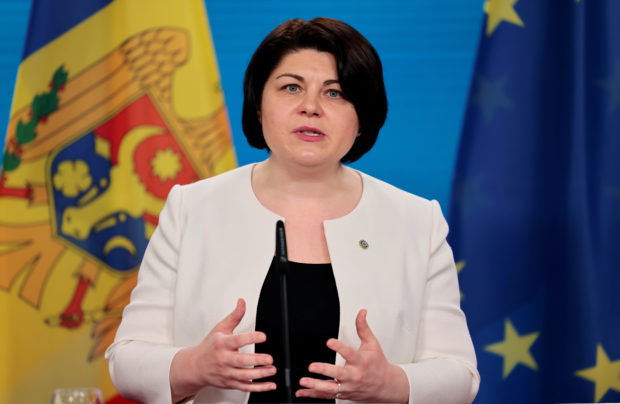
FILE PHOTO: Moldovan Prime Minister Natalia Gavrilita attends a news conference after the donor conference for Moldova to assist the country with the influx of Ukrainian refugees, in Berlin, Germany, April 5, 2022. REUTERS/Hannibal Hanschke
CHISINAU — Thousands of protesters denouncing high inflation and fuel prices massed outside Moldova’s government on Sunday demanding the resignation of pro-Western President Maia Sandu and her government.
It was the largest protest in the small ex-Soviet state since Sandu was elected in a 2020 landslide on pledges to root out corruption. She has since promised to secure membership of the European Union, which has provided large amounts of aid.
The crowd in the city’s main square appeared to number about 20,000 — though opposition organisers said the number was twice as large and police estimated 6,500 were in attendance.
“Moldova is now in clinical death, to which the current authorities have brought it,” said Dinu Turcanu, a politician from the opposition party of Ilan Shor, an exiled businessman convicted of fraud in connection with a $1 billion bank scandal.
The chief suspect in that fraud, business magnate Vlad Plahotniuc, is also outside Moldova, his whereabouts unknown.
Moldova buys its gas from Russian gas giant Gazprom under a contract drawn up last year. The price fluctuates monthly, calculated from the spot price for gas and oil depending on the season. Spot prices have soared this year.
Sandwiched between Ukraine and EU member Romania, Moldova’s territory was, in turns, part of the Russian empire, “greater Romania” and the Soviet Union in the 19th and 20th centuries.
Its 3.5 million are enduring serious economic difficulties associated with energy prices, the cost of which has increased by 29% in September after surging almost 50% in August.
Since Sandu took power, Moldova’s prosecutor general has been removed and its former president, who was close to Moscow, placed under house arrest.
Protesters accused Sandu of failing to negotiate a more reasonable gas price with Moscow. Many set up a tent camp outside government headquarters and vowed to remain in place until Sandu resigns and calls early elections.
The country has slashed its growth estimate to zero for 2022, hurt by record high inflation at 34.3% and interest rates at 21.5%.
Prime Minister Natalia Gavrilita said this month that Moldova’s economy was expected to post moderate growth of 1.5% next year.
Analyst Vitalie Andrievschi dismissed suggestions by some commentators that Sandu resembled late Soviet leader Mikhail Gorbachev, a liberal praised in the West but unpopular at home.
“Sandu’s biggest shortcoming is being unable to communicate with ordinary Moldovans,” he told Reuters. “Sandu and her government are unable to assume their share of responsibility and punish those clearly unable to do their jobs.”